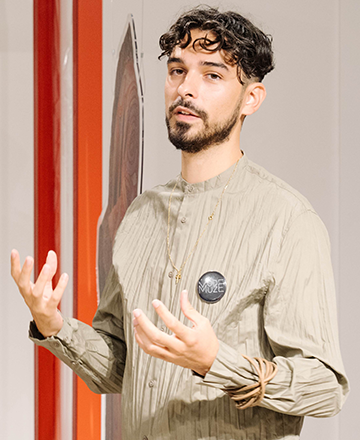Roberto's CV boasts a wide range of museums with which he is or has been affiliated as an intern, trainee or curator. This includes major ones such as the Central Museum in Utrecht and the National Museum of World Cultures, as well as smaller institutions such as OSCAM and Imagine IC in Amsterdam-Zuidoost, the city's south-eastern district. He is also community manager of Modemuze.nl, an online fashion heritage platform. His bicultural background allows him to contribute perspectives and viewpoints rarely expressed in the museum world until very recently. Fashion and connection are the common thread of his work.
Making museums more accessible
‘To me, the museum world mainly felt like a white elitist institution where my stories and those of many with a migrant background went unrepresented. But a lot has changed since my Bachelor's,’ says Roberto. ‘My aim is to make museums more accessible to all. I create novel exhibitions, seeking connections that are not readily apparent. I create a stage for sensitive issues to elicit debate among visitors, encouraging them to engage, to listen to one another and to discover new perspectives. I believe my role is to help people make connections.’
Roberto entered the museum world via his Bachelor's programme in Media, Art, Design and Architecture at the VU, before gaining a Master's in Curating Art & Cultures at the VU and the University of Amsterdam. During his Bachelor's, the Fashion History and Theory module really caught his interest. ‘I learned about the countless layers involved in fashion and style and how these directly reflect their time and place. The way we dress says so much about how we express ourselves socially.’
Work placements are vital
Roberto completed more modules and work placements than required, as he was eager to gain knowledge. He took the initiative for a work placement in his first year, finally completing a series of them. One was at the Central Museum in Utrecht, involving research for the ‘Uit de Mode’ (Out of Fashion) exhibition. ‘Work placements are vital. They let you apply your theoretical knowledge in practice while also building a network, another essential factor.’
He recommends the discipline a degree programme requires. ‘You learn to work systematically, think critically, meet deadlines, deal with criticism and work together in a group, all extremely valuable competences. I often hear people say that they did courses on YouTube, but those don't teach you the skills that a university degree programme does.’
A seat at the table
In 2021, Roberto joined the committee in Almere responsible for naming new streets and squares in his home town. ‘It's such an honour! It brings back learning about street names in Amsterdam, such as why the Herengracht (Gentlemen's Canal) was given its name. I never thought that one day I'd be involved in naming streets. It's quite a privilege!’
Photography: Almicheal Fraay
